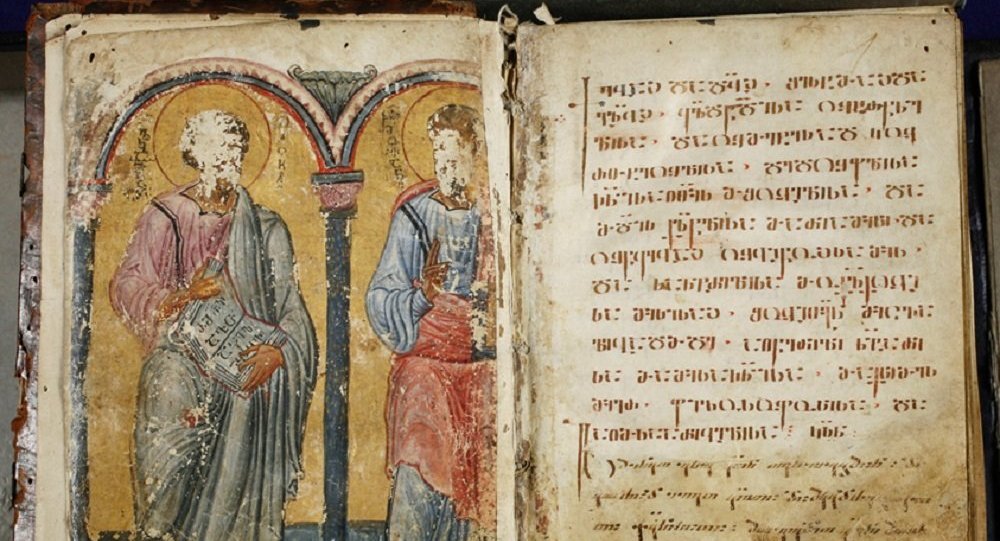The literary history of Georgia begins with the conversion of the country to Christianity in the 4th century; original Georgia literature begins with lives of saints, the first surviving one being that if St. Shushanil (composed c.480). Other early works include an account of the conversion of Georgia by St. Nino and semilegendary stories of the exploits of King Vakhtang Gorgasali, a hero of the 5th century. Much of this material was subsequently woven into the Georgian annals (Kartlis Tskhovreba). The beginnings of a philosophical school in Georgia were laid by the Neoplatonist John Petritsi (d.c. 1125, a disciple of the Byzantine scholars Michael Psellus and John Itallus), who strove to impart to Georgian Orthodoxy a deeper metaphysical content.
Whereas much of Georgian ecclesiastical literature has its roots in Byzantine Greek culture, Georgia's medieval romance and epic are impregnated with the civilization of Persia, blended with original elements of Caucasian folklore. Important prose romances are the Visramiani (Eng. trans. Visramiani: the Story of the Loves of Vis and Ramin, by O. Wardrop, 1914), adapted in the 12th century by Sargis of T'mogvi from an original Iranian romance going back to Parthian times, and Amiran-Darejaniani (Eng. trans. by R.H. Stevenson, 1958), a cycle of fantastic tales of adventure, attributed to Moses of Khoni.
The foundations of secular poetry were laid at the same period by Ioanne Shavteli and Chakhrukhadze, who respectively wrote formal odes in honor of Kind David II "the Builder" (1089-1125) and Queen Tamara (1184-1213). The supreme literary achievement of Georgia's golden age is Shota Rustaveli's epic "Vepkhis Tkaosani" (Eng. trans. The Man in the Panther's Skin, by M.S.Wardrop, 1912). His poetic tradition, broken by the Mongol invasions, was renewed in the 17th century by the royal poets Teimuraz I (1589-1663) and Archil (1647-1713).
Belles-letters revived in Georgia during the 18th century with the lexicographer Sulkhan-Saba Orbeliani (1658-1725), who wrote a book of fables "Dsigni Sibrdzne-Sitsruisa" (Eng. trans. The book of Wisdom and Lies, by. O.Wardrop, 1894); King Vakhtang VI (1675-1737), who founded a printing press in Tiflis and had the Georgian annals edited and completed. The main poets of the period were David Guramishvili (1705-92) and Besarion Gabashvili, called Besiki (1750-91).
The Russian occupation of 1801 brought Georgia into orbit of European intellectual life. Romantic poetry flourished with the work of Alexander Chavchavadze (1786-1846) and the Byronic lyrics of the youthful bard Nicholas Baratashvili (1817-45), founder of the modern Georgian theater. The exponent of the realistic novel was Ilia Chavchavadze (1837-1907), the later being Georgia's most distinguished man of letters of modern times, renowned as an essayist, publicist and poet.
The life of the Georgian mountaineers is brilliantly portrayed in the stories of Alexander Kazbegi (1848-83) and the ballads of Vazha Pshavela (1841-1915). Even more famous was the patriotic poet and man of letters Akaki Tsereteli (1840-1915). Several of Shakespeare's plays were translated by Ivane Machabeli (1854-98).
Under the Soviet regime a number of leading writers, including the novelist Mikheil Javakhishvili and the poets Paolo Iashvili and Titsian Tabidze, perished in the Stalin purge in 1937. However, poets of the stature such as Ioseb Gogebashvili (1889-1965), Galaktion Tabidze (1892-1957), Anna Kalandadze (1924-2008), dramatists such as Shalva Dadiani (1847-1959) and novelists such as Konstantine Gamsakhurdia (1891-1975), Chabua Amirejibi (1921-2014), Otar Chiladze (1933), succeeded in maintaining a high standard of creative originality.



